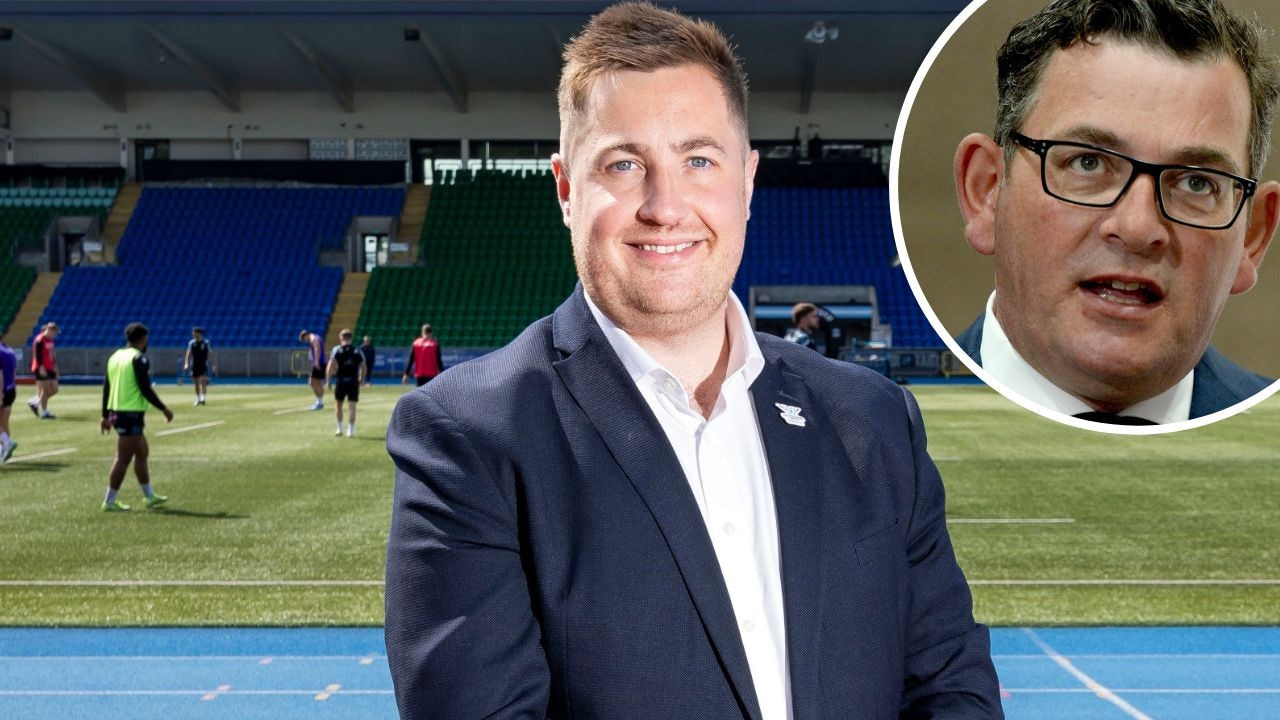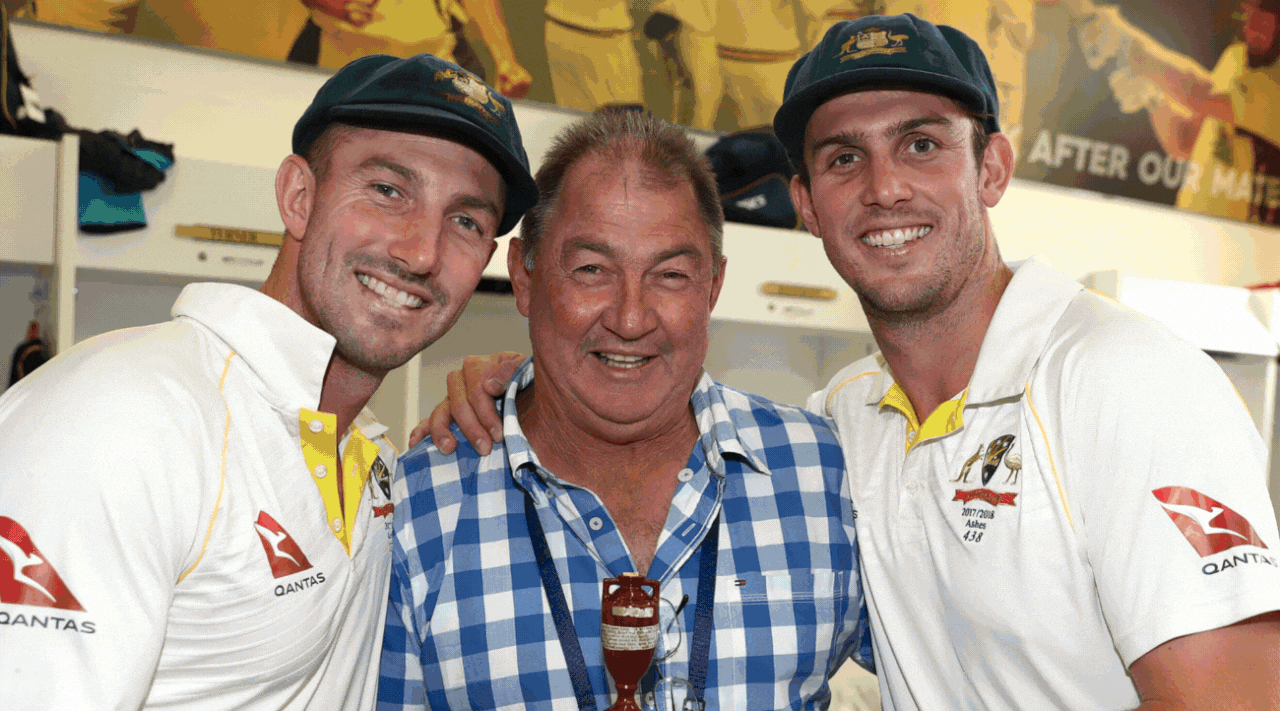Commonwealth Games 2022: Australian pole vaulter Nina Kennedy wins bronze at world championships
It wasn’t long ago that Nina Kennedy’s injury-riddled body nearly gave up on her. Now the Australian pole vaulter is world championships bronze medallist.
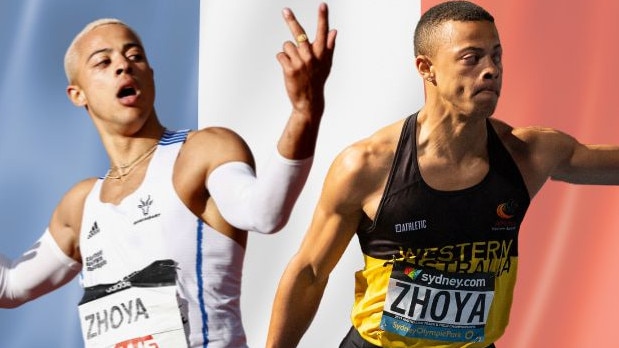
Comm Games
Don't miss out on the headlines from Comm Games. Followed categories will be added to My News.
It wasn’t that long ago that Nina Kennedy was too depressed to finish training sessions.
Her body was so riddled with injury that she couldn’t see an end to the torment which pole vaulting was giving her.
Less than three years later Kennedy is a world championships bronze medallist after producing one of the great clutch performances seen in a long time in Eugene, Oregon.
The 25-year-old West Australian was almost out of the competition at her first height after missing two attempts at 4.45m meaning she had just one final attempt clearance to stay alive.
“I was so nervous, your brain goes to every possibility - it goes to the worst-case scenario which is no-heighting in the final and the best-case scenario which is clearing it,” Kennedy said.
“I just stuck to what I know and that‘s following my cues and I just cleared it.”
Stream Over 50 Sports Live & On-Demand with Kayo. New to Kayo? Try 14-Days Free Now >
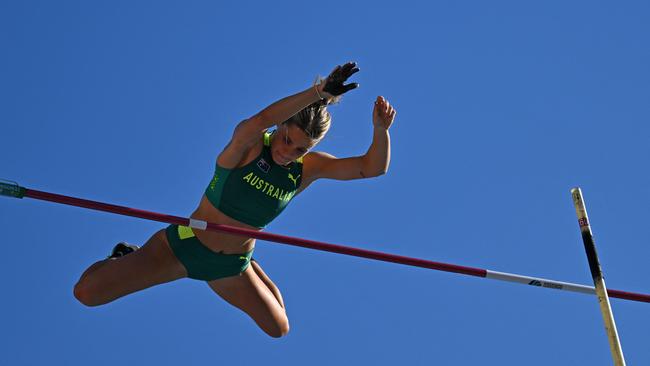
With the pressure valve released, Kennedy went about becoming the first Australian since Tatiana Grigorieva in 1999 to win a world championships medal in the pole vault.
She cleared 4.60m, 4.70m and 4.80m on the first attempt each time to put herself into the medals equation.
It was to be bronze after Kennedy missed twice at 4.85m and ran under the bar in her only attempt at 4.90m - both beyond her PB of 4.82m - to leave Americans Katie Nageotte and Sandi Morris to battle it out for gold.
A promising junior, Kennedy won the bronze medal at the 2018 Commonwealth Games before injuries and her own mental demons struck. She resurrected her career last year, breaking the Australian record before a quad injury and then a Covid drama ruined her Tokyo Olympics.
Kennedy was forced to isolate away from the Olympic village just days out from competition after having been at the same training venue as American pole vaulter Sam Kendricks, who would later test positive for Covid.
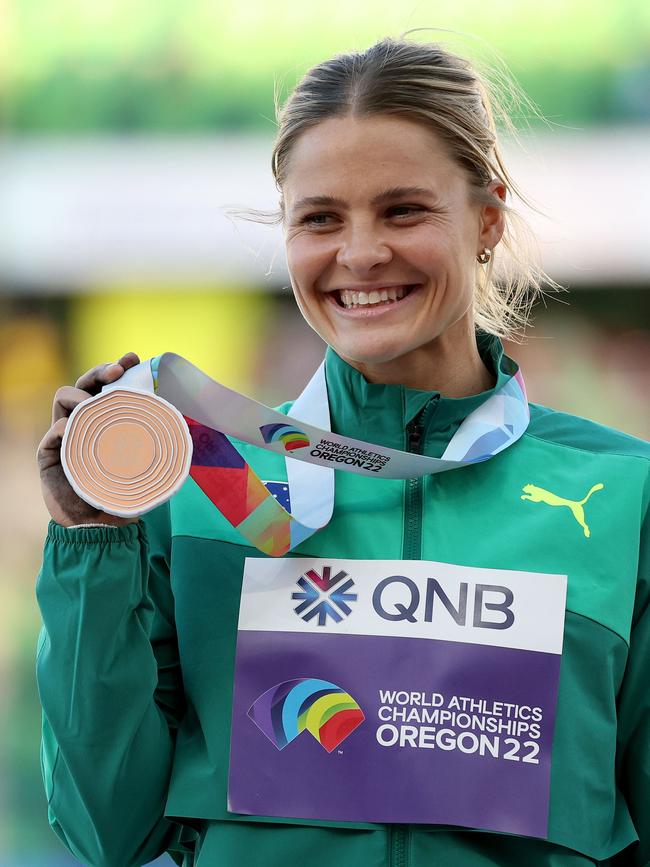
She then failed to even get out of the qualifying round, finishing 12th.
Twelve months later she’s the third-best pole vaulter on the planet and the gold medal favourite for the Birmingham Commonwealth Games.
“I’m so happy with a bronze. It definitely gives me confidence going into the next few years ahead. Those girls are in their 30s. I’m still 25 so I have a few more years to crack that 90 bar,” Kennedy said.
“I think as athletes we are so used to wanting more but I’m going to soak this up. A bronze medal on the world stage is absolutely incredible and I think I’m going to enjoy this feeling for the next few days and next few weeks.”
In the men‘s 1500m semi-finals Stewart McSweyn booked his spot in Wednesday’s final after another frontrunning effort.
The national record holder, who has battled health issues in the lead-up, held onto the final qualifying spot finishing fifth in 3min35.07sec.
Countryman Ollie Hoare weakened over the final 100m after contesting the lead for most of the opening semi-final and didn‘t progress.
Discus-thrower Matthew Denny looked good in qualifying with a second round throw of 66.98m - just 9cm shy of his PB - gaining him automatic entry through to the Wednesday‘s final where he is a legitimate medal chance.
In the men‘s 400m heats Alex Beck advanced to the semi-finals by finishing fifth in his heat in 45.99sce but 2012 Olympic finalist Steve Solomon (46.87sec) was eliminated.
Aths star who turned back on Australia
- Brent Read
Three years ago, the future of Australian track and field stood beside the running track at Sydney Olympic Park, diamond stud in each ear, and spoke about the huge decision that was on his horizon.
Sasha Zhoya was a precocious teenager. A shooting star who had spent his junior years breaking world record after world record.
So good was Zhoya, he was at the centre of a fractious battle between France and Australia. Forget nuclear subs, this was about the future of track and field in the respective countries.
Born in Subiaco to a French mother and Zimbabwean father, Zhoya had his pick of nations. The French came calling armed with a blank cheque and a promise that he would be one of the faces of the Paris Olympics in 2024.
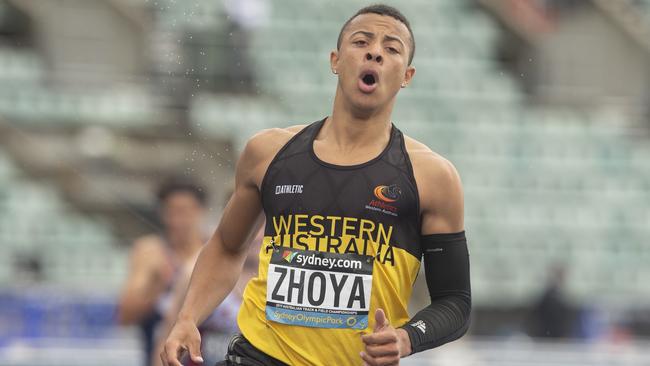
Australian Athletics responded by calling in the heavyweights to keep him in the green and gold. News Corp understands at one point that Zhoya and his mother had a meeting with Channel 7 boss Kerry Stokes, which had been orchestrated by AA.
AA spoke to Zhoya about future opportunities, coaching and outlined a path to greatness. They walked away optimistic about their chances but even the financial might of Stokes and the Seven Network couldn’t convince Zhoya to stay.
Sources close to the talks insist AA was financially out-muscled by the French Federation and the clout of sporting brand Adidas, not to mention the powerful pull of representing the country of his mother’s birth.
The opportunity that was lost was only reinforced a fortnight ago when Zhoya became the champion of France, running 13.17sec in the 110m hurdles - the ninth fastest time in the event this year.
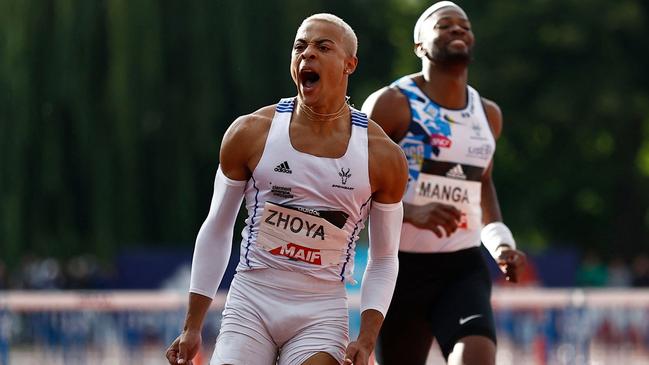
In doing so, Zhoya secured a spot at the world championships - which begin in Portland, Oregon this weekend. Among those to congratulate him on social media were Australia’s own Olympic hurdles queen Sally Pearson and our current national champion Liz Clay, who herself will be in Portland.
“We put a whole bunch of things to him - job opportunities, fast tracking him, getting him into programs,” former AA chief executive Darren Gocher said.
“What he was telling us was that was the sort of thing he wanted. It was not in the same ballpark as what was being offered overseas.
“He had a French mum and they put to him that he would be the face of their Paris 2024 Games from an athletic point of view. None of that we could match.
“We threw as much as we could at him. It is hard when you are trying to fund 150 athletes. You could tell [he was going to be a star].
“He had the build, the attitude, he had a sprinter’s attitude - he has that strut and arrogance.”
Sources closer to Zhoya suggest money wasn’t necessarily the issue. They also claim Zhoya could have been convinced to pledge his future to Australia had things been handled differently.
“It was a very hard decision,” Zhoya told Athletics Weekly last year.
“I was born and raised in Australia and there was a huge part of me that I know is very Australian but I was raised by a French mother and a lot of me was culturally a French person.”
A generational athlete was lost and Australia will be reminded of that in Portland this weekend as Zhoya makes his bow at his first major international track and field event as a senior.
Few doubt it will be the first of many as Zhoya quickly becomes the face of French track and field thanks to his outrageous talent and outgoing personality - he still sports the diamond earrings, has a penchant for dying his hair and grew up worshipping sprint legend Usain Bolt.
He is destined to become a global superstar, the world championships his first opportunity to take his talents to the world.
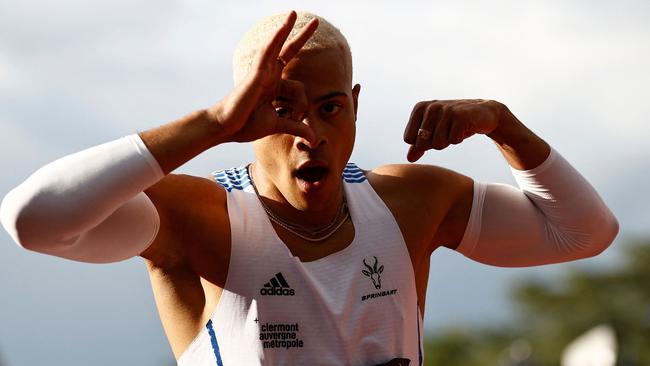
Back in Western Australia, Zhoya’s long-time coach Lindsay Bunn will watch the world championships with a tinge of regret.
When it comes to Zhoya, there will always be a sense of what might have been. Of opportunity lost. It’s a feeling that will no doubt sweep the sport in years to come if Zhoya lives up to the hype.
“The sky is the limit for Sasha,” said Bunn, who began coaching Zhoya nearly a decade ago in Perth.
“The thing about Sasha is that he has all the ingredients - the mental toughness and he is an incredibly talented kid.
“The kid works so hard. A lot of people have misconceptions that he was born a brilliant athlete. I know he will hate me saying this but the truth is when he first came, he was nothing special.
“He went to his first national Little Athletics championships and didn’t win. He took it pretty bad. I noticed a complete change in his attitude when he came back and he started working really hard.
“He is a kid who has a bit of grit about him. He comes from a very humble background. Mentally he is very tough.”
As part of his deal with the French Federation, News Corp understands that Zhoya requested the ability to return to Australia and train in Perth over the summer.
Covid-19 has prevented a recent return, yet he bought a house for his mother in Western Australia and Bunn insists he never misses an opportunity to return home, where he takes joy in helping out indigenous communities.
“He’s outgoing - that’s a polite word for it,” Bunn said.
“There’s a few times he has tested me at training such as when he turned up with pink hair. I am old-fashioned - I had a few words with him.
“He changed it - he came with white hair at the next session. A lot of the stuff people don’t realise with Sasha is the incredible work he did up in the north of Australia.”
That work, Bunn insists, shows the other side of an athlete who has the personality and talent to become a global superstar. Bunn recounts the story of visiting the remote indigenous community of Balgo with Zhoya when he was a 14-year-old.
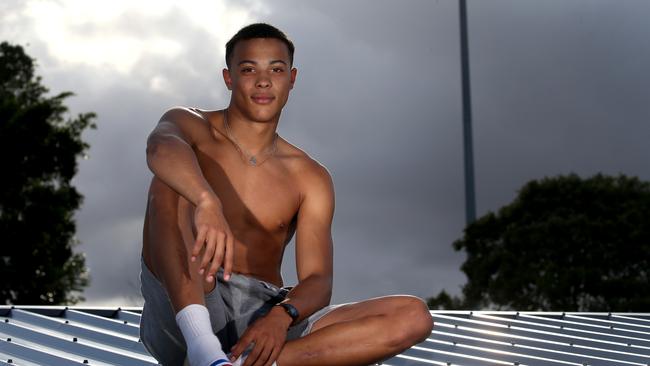
The accommodation was a tin shed and they slept on a cement floor. They spent three hours speaking at the local school and then Zhoya took over, creating an athletics event for the kids.
There was no track so he cordoned off a gravel car park. They found some soft sand and spent two hours digging a pit for the long jump. Another area was earmarked for the javelin.
Zhoya put together a plan for the carnival and it went off without a hitch the next day. They kept coming back for four years.
Despite his maturity off the track, his camp deliberately held him back last year when the Olympics were in the offing. They targeted this year for him to make his mark at senior level.
That day has now arrived.
“He still sees himself as a West Australian,” Bunn said.
“He runs with a black swan on his uniform. When he comes back. he still wants to do all the work in the indigenous community and he has a connection with WA.
“He has a house here. The aim was always to win in Paris. That was always the aim whether he ran for Australia or for France.
“He certainly has the talent and mental ability to win at that level. I think he will be in the sport for a very long time. He will be an asset to Australia ultimately - he still is with the work he does in the indigenous communities.
“I don’t think we have lost him 100 per cent.“
More Coverage
Originally published as Commonwealth Games 2022: Australian pole vaulter Nina Kennedy wins bronze at world championships




